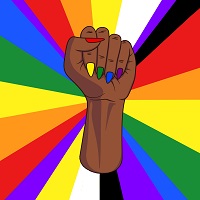The career of comedian Wanda Sykes has arguably come into its own following the transition from Obama to Trump. Though she had first won mainstream acclaim with her Comedy Central hour-long special Tongue Untied in 2003 and then her HBO album Sick and Tired in 2006, Sykes was propelled to the status of comedic commentator of Obama-era politics with her address at the White House Correspondents' Association dinner in May 2009, followed shortly after by her album I'ma Be Me (HBO, October 2009). If these performances, by virtue of their association with the then-sitting POTUS, also consolidated a White liberal[1] contingent of the comic's fanbase, the transition to the Trump era saw Sykes' more overt, direct critique of White mainstream spectators. While in I'ma Be Me she launched impersonal attacks on the likes of Rush Limbaugh, in the album Not Normal, released on Netflix in 2019, she poked fun at White audience members' ways of acting and being in the world, linking these to the struggles of #Blacklivesmatter. At the same time, rhetorically and theatrically, Sykes has increasingly leveraged her identity as a Black lesbian in the service of this critique.
Wanda Sykes' popularity in fact reflects the patterns defining both the histories of stand-up comedy and queer Black women activists in the United States. The US stand-up comedy industry has always catered to a mainstream public by means of comics' performance of a “rhetorical marginality” (Gilbert 2004). Initially dominated by Jewish comics, throughout the period 1990–2010, the industry witnessed diversification at a level of race, gender, and sexual identity. Equally, Sykes' trajectory echoes Audre Lorde's reflections in Sister Outsider (1984). Queer Black women, sidelined by White-dominated feminism and lesbian circles, and by the male-dominated anti-racist movement, occupy a position of the “constitutive outsid[er]” to borrow a Derridean term. Queer Black women's authentic expression of the self may thus be enabled by a critique of all the cultural groups from which they are excluded (Lorde 1984). These histories delimit the possibilities and limits of Sykes' agency as a queer Black woman speaking to a White contingent of the mainstream public; as film producer Effie Brown observes, White patrons of Black American culture have a habit of elevating the few Black women who make it with mainstream publics to a hyper-visible platform in order to assuage White liberal guilt (qtd. in Moore 2018).
Heeding Alfred L. Martin Jr.'s (2020) warning—that critics would do well to consider the conditions of production and reception of Black queer images before evaluating whether they are “positive” or “negative”—I propose in this paper to analyse White liberal reactions and responses to Wanda Sykes' comedy. I intend this to be an embodied analysis, factoring in my own evolving take, as a White scholar and spectator, on the comic's sets from I'ma Be Me to Not Normal. I will contextualise my analyses in philosopher George Yancy's theory of the White gaze. I will attempt to reflect on the extent to which Sykes enables (or not) White liberals' confrontation with what Yancy calls an “opaque” part of the White self (2015) premised on our ignorance of psychically internalised privileged ways of thinking.
Bibliography:
GILBERT, Joanne. Performing Marginality: Humor, Gender, and Cultural Critique. Detroit:
Wayne State UP, 2004.
LORDE, Audre. Sister Outsider and Other Essays. Trumansburg: The Crossing Press, 1984.
to be associated in the French.
MARTIN, Alfred L., Jr. “For scholars... when studying the queer of color image alone isn't
enough.” Communication and Critical/Cultural Studies, vol. 17, no. 1 (2020): 69-74.
MOORE, Candace. “Producing Black Lesbian Media.” In Sisters in the Life: A History of Out
African American Lesbian Media-Making. Duke UP: 2018.
YANCY, George. “Introduction.” In White Self-Criticality beyond Anti-Racism: How Does It
Feel To Be A White Problem?. Ed: George Yancy. Lanham: Lexington, 2015.
[1] By “liberal” I mean socially progressive, rather than the economic liberalism with which the term “libéral” tends
to be associated in the French.

 PDF version
PDF version
